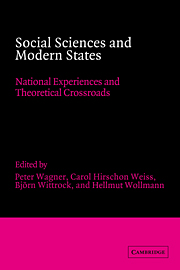Book contents
- Frontmatter
- Contents
- Acknowledgements
- Notes on contributors
- Part I National experiences in comparative perspective
- Part II Policy sciences at the crossroads
- 12 Frame-reflective policy discourse
- 13 Research programmes and action programmes, or can policy research learn from the philosophy of science?
- 14 Policy research: data, ideas, or arguments?
- 15 Social knowledge and public policy: eight models of interaction
- Part III Epilogue
- Index
12 - Frame-reflective policy discourse
Published online by Cambridge University Press: 05 February 2012
- Frontmatter
- Contents
- Acknowledgements
- Notes on contributors
- Part I National experiences in comparative perspective
- Part II Policy sciences at the crossroads
- 12 Frame-reflective policy discourse
- 13 Research programmes and action programmes, or can policy research learn from the philosophy of science?
- 14 Policy research: data, ideas, or arguments?
- 15 Social knowledge and public policy: eight models of interaction
- Part III Epilogue
- Index
Summary
FRAMING IN POLICY DISCOURSE
Where Part I of the volume has examined national experiences with regard to the relation between social knowledge and the state, Part II takes up cross-cutting questions about the relationship between the two realms. The first issue we address is the nature of public-policy processes to which social science is expected to contribute. This chapter, and the following chapter by Majone, seek to conceptualize the policy process in innovative ways in order to clarify the relationship with policy-oriented social science.
In policy practice, there are stubborn policy controversies that tend to be enduring, relatively immune to resolution by reference to evidence, and seldom finally resolved. At best, they may be temporarily settled by electoral processes, power grabs, or bargaining. Or with shifts in a larger context, they may simply disappear for a time, only to re-emerge later on in some new form.
The careers of these controversies – one might think of the disputes over nuclear arms, welfare, or the status of women – are not to be understood in terms of the familiar separation of questions of value from questions of fact. For the participants in them construct the problems of their problematic policy situations through frames in which facts, values, theories and interests are integrated. Given the multiple social realities created by conflicting frames, the participants not only disagree with one another but also disagree about the nature of their disagreements.
- Type
- Chapter
- Information
- Social Sciences and Modern StatesNational Experiences and Theoretical Crossroads, pp. 262 - 289Publisher: Cambridge University PressPrint publication year: 1991
- 96
- Cited by

